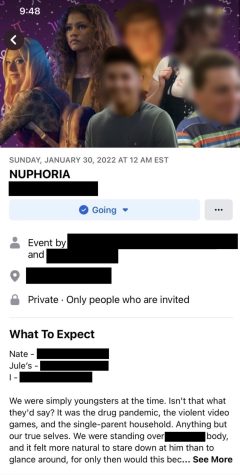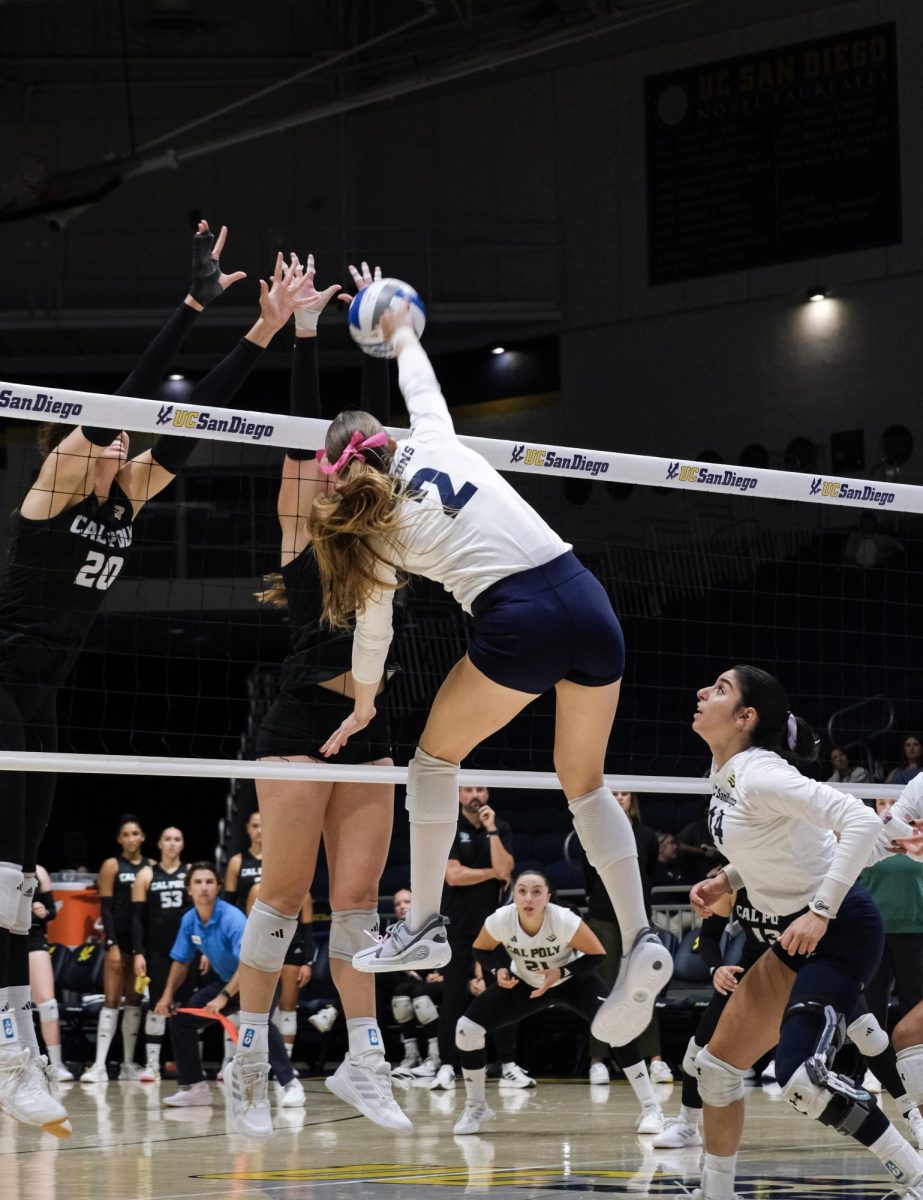UCSD Sororities Suspend Social Relations with Fraternities Amidst Allegations of Misconduct, Sexual Assault, Drugging, and Violence
Photo by Ava Bayley/ UCSD Guardian
Feb 21, 2022
Editor’s Note: This article contains potentially upsetting anecdotes and descriptions of sexual harassment, sexual assault, drug use, racism, and violence.
In a decision announced internally on Feb. 15, UC San Diego’s Collegiate Panhellenic Association effectively canceled social events with all chapters in the Interfraternity Council for the remainder of Winter Quarter 2022. The CPA decision comes in response to rising allegations of sexual assault/harassment, drugging, and physical violence occurring at off-campus fraternity parties.
The canceled social events across Sorority and Fraternity Life include “exchanges,” which are social events that typically occur between a designated sorority and a fraternity. The decision doesn’t include “opens,” which are larger events where both those affiliated and unaffiliated with SFL are welcome to attend. For this reason, practices differ between fraternal chapters on who is welcome to attend their opens — especially when considering whether men who are not in their chapter are allowed to attend.
An anonymous upperclassman from a UCSD sorority shared with The UCSD Guardian that CPA’s desired next step is to work with IFC to strengthen their communications and connections. Some of their goals are to reach an agreement that attempts to mend the situation through heightened risk prevention policies, recognition of the victims’ trauma, and ultimately comprehensive measures that empower members of SFL to feel safe and comfortable at social events.
An imperative measure she highlighted was to look closely at the chapters which have allegations against them.
“What we wanted to see was that they care and just hear us out and care about amending the situation as much as they can,” she said to The Guardian. “Obviously, you can’t time travel and stop it from happening, but one of the things that is really important is finding out if it’s a chapter that is cultivating that kind of and perpetuating that kind of behavior or whether it just happened to be an individual in that situation.”
The anonymous member stated that IFC needs to have better risk management practices that are communicated more clearly to party attendees. She recognizes two truths: the boards of SFL, CPA, and IFC are doing what they can to protect their members, and that their lack of expertise due to their age and their experience dealing with assault allegations may make it more difficult to work effectively.
Above all, she said that she hopes that people recognize the traumatic nature of this situation rather than view it as gossip.
“I want people to remember that this isn’t just gossip about who can’t hang with who,” she said. “People have actually been traumatized and people are actually going through legal channels and there are actually open investigations and this is actually a very serious thing and it’s not just ‘no more partying.’”
In the perspective of a second anonymous source from a UCSD sorority — who wanted to remain anonymous to avoid possible repercussions — halting social relations with IFC is the safest decision for everyone at the moment.
Despite this decision, the member has expressed concern that students will still throw parties regardless of the ban and that unofficial parties likely will not have the same supervisions (e.g. sober monitors) that allow people to seek help and accountability lest something go wrong. She is also worried that behaviors will not change, due to her belief that current fraternal measures to handle allegations (e.g. the revocation of access to parties or membership in the chapter) do not provide consequences serious enough to match the gravity of the offense.
“I think the entire idea is to kind of let things cool off, work on it for the rest of the quarter, and then get back next quarter and just continue as if nothing really happened,” this sorority member said. “Which I am pretty skeptical about because I feel like that’s what we say every single time and I haven’t seen a single change in IFC since I came to this school.”
Previous Allegations Among SFL at UCSD
Most recently, allegations of assault and drugging occurred at a Jan. 30 Sigma Nu party; it was themed after the TV show “Euphoria,” which itself has met criticism for potentially glorifying drug use. The party was open, meaning that anyone could attend as long as they obtained a wristband.
The anonymous sorority member, who attended the “Nuphoria” party, said that approximately 400-450 wristbands were allotted for distribution to guests in order to attend the party. From her perspective, the event was unable to be properly supervised due to the fact that the house’s capacity was not suitable for the large number of individuals in attendance. To her, this created a significantly overcrowded, sweaty, and uncomfortable environment.
In addition, she said that there were a plethora of popular recreational drugs at the party, including alcohol, cannabis, nicotine, LSD, MDMA, psilocybin, cocaine, ketamine, and lean. To her, the level of intoxication she witnessed was greater than she had seen at any other event; she believed people to be past the point of being able to ensure their own safety, to ensure the safety of those around them, and to hold others accountable for inappropriate behavior.
“I think the Sig Nu party kind of pushed it over the edge because that was like a—there were so many allegations that night that people just had to point fingers and everyone was panicking because people were drugged and people were sexually assaulted out in the open and people got hit and cut open and it was so bad,” the sorority member said.
Safety protocols that Sigma Nu stated they would implement in their Facebook invitation were not enforced, according to the sorority member.

“Sig Nu said that they would have a strict [COVID] policy and they definitely did not,” she said. “They also said wristbands would be pretty strict, but I feel like 450 wristbands of a very generic color being given out to people to distribute […] I think it was not a great way of ensuring that people’s safety was a top priority.”
As the second anonymous sorority member said, the scope of misconduct and abuse expanded past the events of the Sigma Nu party — and fraternity parties in general. She stated that fraternity members generally behave disrespectfully and are exclusionary towards those who are not in fraternities.
An anonymous employee at UCSD Recreation stated that she was verbally harassed by players on the IFC basketball intramural teams a few weeks ago after instructing them to leave when the building was closing. She said most fraternities there were involved in the harassment — some of whom she previously considered to be her friends.
“The most recent completely jarring one was being called a [b—-] and a [w—-] and a [c—] by members of IFC,” she said. “Also being hit on to my face super explicitly by members of Pike, like they walked behind me and literally said ‘Look at her ass,’ and then one of them was like, ‘I wish my girl had a booty like that.’ And I turned around and I was like, ‘Are you serious?’ and they just laughed in my face and kept going and were so disgusting about it. I had problems with almost every single frat there and all of them making comments and being disrespectful.”
“I had friends that ignored me — or I guess I wouldn’t call them friends now — people that I knew and had been friendly with that ignored me that then turned around and called me a [b—-] to all of their friends for doing my job,” she continued.
These recent allegations are not isolated events. CPA’s decision follows a public sexual assault allegation against the president of Phi Gamma Delta (commonly known as Fiji) in Fall Quarter 2021 and the University’s ongoing, multi-year suspension of Sigma Chi due to sexual assault allegations since Spring Quarter 2019.
In Winter Quarter 2010, Pi Kappa Alpha (Pike) and IFC threw the racist ‘Compton Cookout’-themed party. The event’s aftermath led to the dubbing of Winter Quarter 2010 as “Black Winter” and was referenced in director Justin Simien’s film “Dear White People.” In Spring Quarter 2003, images of the Ku Klux Klan appeared on allegedly-falsified Spring Rush fliers for Sigma Chi.
In a since-deleted Instagram post, Fiji announced that they removed the former president from the chapter. Sigma Chi continues to operate locally outside of affiliation with UCSD.
Junior Cara Puscasiu, a formerly-affiliated member of the Pi Beta Phi sorority, dropped her chapter in an act of an alliance with victims of sexual assault nationwide; she felt a widespread lack of support from the Panhellenic community towards victims. Puscasiu said that when she asked her chapter to inform SFL about an individual (non-affiliated but in adjacent social circles) who had assaulted her, no action was taken. Puscasiu also felt as though she was denied the opportunity to take on a leadership position within her sorority due to assumptions made about her in terms of her involvement in sexual assault allegations and the perceived state of her mental health.
“As I learned more about the internal structures of Greek Life as a whole — nothing related to Pi Phi, specifically — but, the environment of protecting sexual assaulters and people who are accused of things — there should be a zero-tolerance policy and it just doesn’t seem like there is,” Puscasiu said.
Puscasiu emphasized that both Panhellenic and IFC should have more strongly established channels in place that consistently educate and enforce policies about assault and abuse. Considering how common cases of assault and abuse are among SFL, she thinks it vital for these education and policy practices to prevent the enablement of assaulters and abusers – who are both formally affiliated and non-formally affiliated with SFL.
“The chapter didn’t do anything even when I talked to higher-up people,” she continued. “[…] Just kept saying they would talk to people higher up [across SFL], and then I basically asked like 4-5 times and like, ‘Oh, did you ever hear back from them?’ They’re like, ‘We’re just dealing with something a lot recently so we haven’t been able to talk to them specifically about this, and then, by the time I dropped there was not anything really that could be done.”
An anonymous member of one of the fraternities stated above said that he feels disappointed by the continuous cases of sexual assault and the general intoxigenic nature of SFL, especially in light of various chapters’ statements that say they are working to rectify existing cases of assault and strengthen risk prevention practices.
“They claim to be really against sexual assault and everything that comes with it, but it obviously keeps happening,” he said to The Guardian. “I feel like a lot of time when they kick them out it’s just like a publicity stunt — just like to make sure the sororities know that they don’t do it or that they take action against it.”
“I think that, for the majority of the people in Greek life, over at least 75%, […] they go there for the reason of a potential sexual encounter,” the fraternity member continued.
Additionally, the member of the fraternity stated that he is saddened by watching the impact that sexual assault in SFL has on victims in real time.
“Seeing the flip side of those who have had the bad things happen to them that […] they’re stopping the parties for — the sexual assault — I’ve known people who are the ones that have been assaulted,” the anonymous source said. “I think that it’s really sad that I was, and all my college friends were a part of something that could lead to so many cases of that. And it’s not just an anomaly.”
Moving Forward
As previously mentioned by the first anonymous source from a sorority, CPA hopes to proceed by strengthening communications and relations with IFC in a manner that honors CPA’s requests to increase safety and comfort.
The anonymous fraternity member offered suggestions on how to increase safety at social events in a way that demonstrates IFC takes this matter seriously. One option is to decrease and set a limit on the amount of alcohol bought in preparation for a social event. Another would be to move social events entirely away from individual off-campus homes to rented venues; hosting an event at a venue would help limit excessive consumption of alcohol and ensure alcohol is not served to those under the age of 21.
“Most of them, if that got taken away, they wouldn’t see the point of Greek life, which is sad, but oh, well,” he said.
Puscasiu stated she believes sororities and fraternities both should spend their time without social events trying to make concerted efforts to increase communication and transparency about their behavioral standards and risk prevention policies.
“It would be good for them to communicate standards and really proactively create measures to actually prevent this from happening in the future,” she said. “I think it’s a first step, but they have to take this time wisely because they can’t just be like ‘Yeah we’re taking a break and holding people accountable and investigating,’ like we’ve all heard that a million times. And then nothing really changes, and I think UCSD should be that university that really puts an end to these types of things because it’s so normalized — it’s disgusting.”
The second anonymous sorority member echoed sentiments that the cancellation of social events is a good first step. She continued that she believes harm reduction practices are a necessary implementation to move forward in creating lasting change. Her ideas include comprehensive harm-reductionist drug education that seeks to teach young adults about drug interactions and dosages that cause overdoses. She said that sexual assault and harassment training within SFL should be redesigned to place greater emphasis on the consequences of assault that will follow the victim and the perpetrator for life. Additionally, the source said that allegations of sexual assault need to be seriously investigated and with more serious repercussions for perpetrators within their chapters. Finally, she questioned how impactful a consequence of being dropped from one’s chapter actually is.
The Guardian reached out to SFL, CPA, IFC, and the publicly-available contacts for the chapters’ executive members for comment. SFL, CPA, and IFC did not respond to a request for an interview. 12 of 12 contacted sorority boards and 11 of 12 contacted fraternity boards did not respond to a request for an interview.
Editor’s Note: The author of this article was affiliated with the Sigma Kappa sorority from Fall Quarter 2019 until her resignation in Summer 2020. Additionally, she is currently employed at UCSD Recreation, where one anonymous source also works. Their shared place of employment did not impact the production of this article in any way.
Correction: This article was revised at 8:48 p.m. on Feb. 21 to blur the faces of the students depicted in the Facebook invite.
Correction: This article was revised at 9:56 a.m. on Feb. 22 to clarify Puscasiu’s reasons for resigning from SFL, her perspective on channels for responding to assault, and to retract sensitive information.
Artwork courtesy of Ava Bayley for The UCSD Guardian.



















drift boss • Mar 8, 2022 at 3:39 pm
Thank you for reading this article!
J.E.R. • Mar 3, 2022 at 11:53 am
Incorrect… CPA has not reversed the ban. FYI
Abe L • Feb 26, 2022 at 11:50 pm
It’s important to have facts and evidence in this age of fake news. Reporting based on speculation and hearsay are dangerous and terrible for everyone involved.
Jameis Winston • Feb 22, 2022 at 1:34 pm
Jfc, I don’t know how you guys can publish something based solely on word of mouth and zero factual evidence with so much bias. I get you hate Greek life but if you wanna cover a story HEAR BOTH SIDES FIRST. WHY NOT MENTION HOW SOROTIES ARE COVERING UP SA/USING DRUGS AT PARTIES. ALSO CPA REVERSED THE BAN THEMSELVES ALREADY.